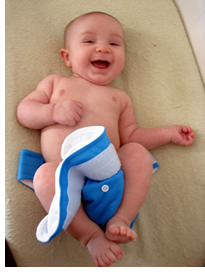Setting a Guinness Record One Cloth Diaper at a Time
 Cloth Diaper Enthusiasts preparing to set Earth Friendly World Record on April 23 Locally, Around Globe
Cloth Diaper Enthusiasts preparing to set Earth Friendly World Record on April 23 Locally, Around Globe
Cloth diapers have come a long way in the past ten years. An event, called the Great Cloth Diaper Change 2011, already creating buzz not only in North America, but all over the world, will take place on Saturday, April 23, 2011 in locations all around the globe. The Great Cloth Diaper Change will set a world record for the most cloth diapers ever changed simultaneously.
Alicia Hunt, a Medford resident, will be co-hosting a location with the Diaper Lab of Somerville at noon at the Somerville Armory, 191 Highland Avenue, Somerville. Bags of samples and coupons will be available to the first 25 registered attendees courtesy of the Diaper Lab. Those interested in volunteering or donating to the event are invited to contact Alicia at via email at alicia@greenlifestyleconsulting.com. All registered attendees will be entered into the grand prize, end of day raffle at the Diaper Lab.
Registration and more information is available online at http://www.diaperlab.com/. Please register as soon as possible as the location only can accommodate 50 adult/child pairs.
Our goal is to make cloth diapering mainstream! Disposable diapers have major environmental and health impacts that many people are unaware of.
Here are a few facts about disposables that might surprise you:
– From birth-to-potty training, each baby will wear about 6000 disposable diapers.
– Disposable diapers take 250-500 years to decompose.
– Once they are used, roughly 90 percent to 95 percent of the 18 billion feces-and urine-filled disposable diapers enter the household trash stream and ultimately end up in landfills, creating an immediate public health hazard. Leachate containing viruses from human feces (including live vaccines from routine childhood immunizations) can leak into the Earth and pollute underground water supplies. In addition to the potential of groundwater contamination, air-borne viruses carried by flies and other insects contribute to an unhealthy and unsanitary situation.
– Disposable diapers expose babies to harmful toxins including dioxin, TBT and sodium polyacrilite and are linked to increases in skin sensitivities, respiratory illnesses and even declining fertility rates in males!
There are approximately 312,152,800 children under the age of 2 in the world. If even half of them use single-use, throwaway diapers, 867,000 diapers will enter landfills during the ONE MINUTE it will take to change diapers at the Great Cloth Diaper Change. At least 39,000 tons of diaper waste (representing enough diapers to go all the way to the moon if laid out) would enter landfills THAT DAY ALONE.
Just as people are rejecting single-use plastic water bottles and grocery bags in favor of reusable versions, increasing numbers of parents are choosing reusable diapers, thereby literally cutting their household waste in half.
Heather McNamara, of the Real Diaper Association, says that “our local volunteers are finding growing numbers of parents coming to find out about cloth diapers, whether it be for environmental, financial, or health reasons – – or even because these diapers are just plain cute!†It is the hope of the organizers that this event will be an eye opener and an inspiration for expecting and new parents to use cloth diapers, a more planet friendly alternative that also saves parents substantial money.
Please join us on April 23rd to change cloth diapers and raise awareness about this exciting event.
How it all started
The Great Cloth Diaper Change 2011 was initially the brain child of Judy Aagard of Tiny Tots in California, as a way to show our country and the world that cloth diapers are a real option for today’s families. After initial contacts with Guinness World Records™ she saw the potential to help further enhance the cloth diapering movement, while setting a world record. The response has been above and beyond expectations. It is evident that cloth diapering has a formidable following not just in North America, but truly around the world. What better way to celebrate Earth Day 2011?
– Submitted by Alicia Hunt, Medford event organizer